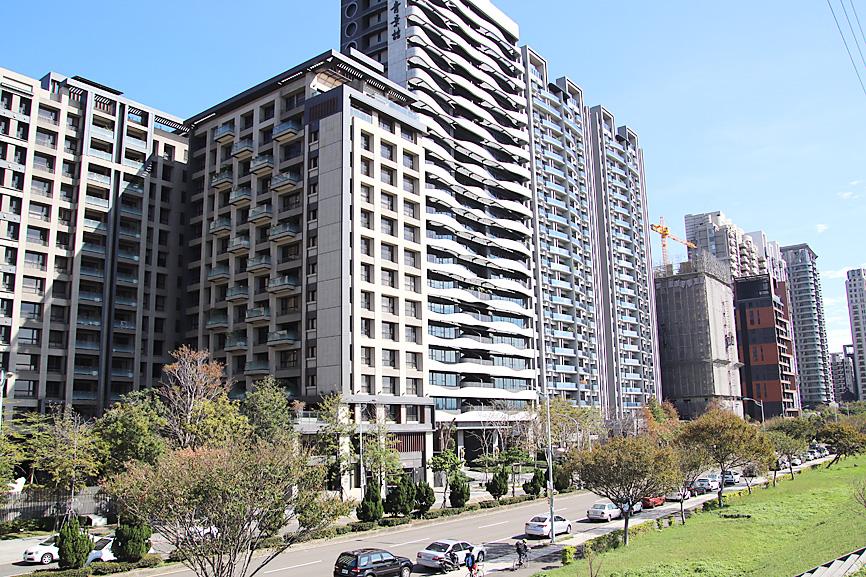Guansin Borough (關新) in Hsinchu City had the highest average annual household income among all villages in Taiwan in 2020, Ministry of Finance data showed.
The average annual household income in Guansin was more than NT$3 million (US$100,823), income tax data released last week showed.
The data, which cover about 6.46 million households, mean that Guansin has retained its ranking as the richest village in Taiwan, the ministry said.

Photo: Huang Mei-chu, Taipei Times
Located in the city’s East District (東區), Guansin is home to many technology professionals who work in the nearby Hsinchu Science Park (新竹科學園區), where tech firms such as Taiwan Semiconductor Manufacturing Co (台積電) have production bases.
Yongfu (永福) in Taipei’s Shilin District (士林) was the second-richest borough, with an average annual household income of NT$2.854 million, followed by Zihli (自立) in Kaohsiung’s Zuoying District (左營) with NT$2.707 million, Jhongsin (中興) in Hsinchu County’s Jhubei City with NT$2.393 million and Tongping (東平), also in Jhubei, with NT$2.378 million, the ministry said.
High household incomes in Jhongsin and Tongping boroughs also reflect their proximity to the Hsinchu Science Park, observers said.
Entrepreneurs have been moving to Yongfu since the completion of several high-rise residential complexes there, which has boosted the borough’s average household income, they said.
Zihli’s ranking was based on the only two household incomes that were reported in 2020, the ministry said.
In terms of median household income, Guansin topped the rankings with NT$2.492 million, while the figure was only NT$658,000 in Yongfu, despite its high average household income, indicating a large wealth gap, the ministry said.
Hsinchu City topped the list of wealthiest cities with an average annual household income of NT$1.127 million, while Taipei was second with NT$1.068 million, followed by Hsinchu County with NT$1.004 million, the data showed.
Hsinchu City also ranked first regarding the average household wage, with NT$900,000, ahead of Hsinchu County with NT$817,000 and Taipei with NT$748,000.
Meanwhile, Taipei was No. 1 in terms of income from interest, rent, royalties, stock dividends and from property transactions and business, the data showed.

FORCED LABOR: A US court listed three Taiwanese and nine firms based in Taiwan in its indictment, with eight of the companies registered at the same address Nine companies registered in Taiwan, as well as three Taiwanese, on Tuesday were named by the US Department of the Treasury’s Office of Foreign Assets Control (OFAC) as Specially Designated Nationals (SDNs) as a result of a US federal court indictment. The indictment unsealed at the federal court in Brooklyn, New York, said that Chen Zhi (陳志), a dual Cambodian-British national, is being indicted for fraud conspiracy, money laundering and overseeing Prince Holding Group’s forced-labor scam camps in Cambodia. At its peak, the company allegedly made US$30 million per day, court documents showed. The US government has seized Chen’s noncustodial wallet, which contains

SUPPLY CHAIN: Taiwan’s advantages in the drone industry include rapid production capacity that is independent of Chinese-made parts, the economic ministry said The Executive Yuan yesterday approved plans to invest NT$44.2 billion (US$1.44 billion) into domestic production of uncrewed aerial vehicles over the next six years, bringing Taiwan’s output value to more than NT$40 billion by 2030 and making the nation Asia’s democratic hub for the drone supply chain. The proposed budget has NT$33.8 billion in new allocations and NT$10.43 billion in existing funds, the Ministry of Economic Affairs said. Under the new development program, the public sector would purchase nearly 100,000 drones, of which 50,898 would be for civil and government use, while 48,750 would be for national defense, it said. The Ministry of

SENATE RECOMMENDATION: The National Defense Authorization Act encourages the US secretary of defense to invite Taiwan’s navy to participate in the exercises in Hawaii The US Senate on Thursday last week passed the National Defense Authorization Act (NDAA) for Fiscal Year 2026, which strongly encourages the US secretary of defense to invite Taiwan’s naval forces to participate in the Rim of the Pacific (RIMPAC) exercise, as well as allocating military aid of US$1 billion for Taiwan. The bill, which authorizes appropriations for the military activities of the US Department of Defense, military construction and other purposes, passed with 77 votes in support and 20 against. While the NDAA authorizes about US$925 billion of defense spending, the Central News Agency yesterday reported that an aide of US

UNITED: The other candidates congratulated Cheng on her win, saying they hoped the new chair could bring the party to victory in the elections next year and in 2028 Former Chinese Nationalist Party (KMT) lawmaker Cheng Li-wun (鄭麗文) yesterday won the party’s chair election with 65,122 votes, or 50.15 percent of the votes. It was the first time Cheng, 55, ran for the top KMT post, and she is the second woman to hold the post of chair, following Hung Hsiu-chu (洪秀柱), who served from 2016 to 2017. Cheng is to succeed incumbent Eric Chu (朱立倫) on Nov. 1 for a four-year term. Cheng said she has spoken with the other five candidates and pledged to maintain party unity, adding that the party would aim to win the elections next year and